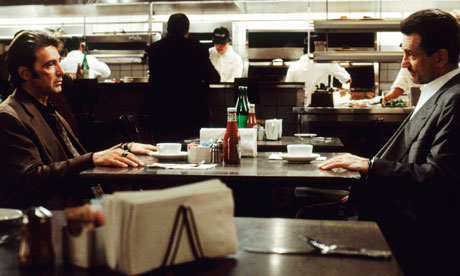Synopsis:
Al Pacino portrays Vincent Hanna, a cop obsessed with bringing down master criminal Neil McCauley (Robert De Niro) and his tight-knit crew.
Thematic Analysis and Review:
In 1995, Michael Mann achieved something no other film director had been capable of accomplishing; Al Pacino and Robert De Niro were finally set to work with one another in the same film*. Renowned for their tireless work ethic, their obsessive preparation and their legacy of skilled performances, the thought of Pacino and De Niro in the same film was a dream come true.
But there needed to be a perfect film** for them to expose their raw acting talent to one another. In Michael Mann’s ‘Heat’, the two of them are presented a blank canvas to operate upon, and as a result, deliver highly effective but yet (on the surface) vastly different performances***.
‘Heat’, in a basic sense, is simply about cops and robbers, which is not all that original of an idea. Especially since Hollywood has tended to exploit the genre to such a degree that it has become extremely difficult to discern one crime film from another. But ‘Heat’ is different. Superficially, the film is about an obsessed and tightly wound cop, Vincent Hanna (Al Pacino), in hot pursuit of a crew who are led by a controlled and emotionally restrained individual, Neil McCauley (Robert De Niro). However, in retrospect, the film is about so much more then simply “good” guys and “bad” guys. It’s about obsession and loneliness. It’s about respect and admiration. It’s about the human condition and how frail it truly can be.
Ian Nathan, writer for Empire Magazine****, may sum it up best when discussing the idea of thematic depth within ‘Heat’: “Michael Mann manages to encompass layers of character and theme, as well as action and extraordinary cinematic technique, to create a coruscating picture of the causes, consequences and human costs of crime in a fragmented world (2001).
To put it simply, Vincent Hanna is a man possessed in his pursuit of Neil McCauley. So much so that it accelerates the deconstruction of his personal relationship he has with his wife (Justine), as they can no longer communicate on a one-to-one level. Neil, on the other hand, lives a structured existence with no attachments to anything (not even furniture). If need be, he is set to flee at a moments notice. As he so “poignantly” points out, “Don’t let yourself get attached to anything you are not willing to walk out on in 30 seconds flat if you feel the heat around the corner”. Both of these men live by rules and procedures. They are the best at what they do because they discipline themselves to do so. It is only in personal communication with others that they are left unaccustomed, lost for words.
Nothing sums this up more than when Vincent has been called to the scene of a homicide. A prostitute has been murdered and Vincent seems at ease with it (as if he is used to it). It is only when the mother of the murdered girl runs onto the scene that Vincent is left speechless. He does not know how to verbally console the mother, nor does he know how to assist her in any other way. He simply stares at her, lost in her cries of agony.
T put it simply; both Vincent and Neil are emotionally fragile individuals. One is a cop and one is a criminal, but yet they share a common bond in their lack of understanding of how to connect with someone on a personal and emotional level. That is why their first meeting during the coffee shop sequence is so crucial to the understanding of these men as emotionally aloof human beings. According to Ian Nathan, this scene is the foundation for the whole film: “On the surface, it is just a superficial conversation-two guys shooting the breeze-but actually it’s the delicate dance of two disparate souls finding a connection” (2001).
The Loneliness of Los Angeles
‘Heat’ is a visually stunning film in the fact that it takes place within the overpopulated Los Angeles, but yet is shot in such a way as to depict it as a lost and lonely land *****. Mann and cinematographer Dante Spinotti present a unique vision of the City of Angels: “Filmed across 65 separate LA locations (and no soundstages), this is an urban milieu almost space-age in its abstract beauty, but emotionally desolate, a blank canvass against which the dispossessed act out their desperate dramas. Nothing anchors people-all the houses are stunningly angular, magnificent architectural vacuums free of personality” (Nathan, 2001).
This is no easy feat to accomplish and definitely requires the directing chops of a highly skilled artist such as Mann. To create a sense of anguish and isolation in a land so immense is a true indicator of the talent of this auteur.
‘Heat’ is a highly ambitious (perhaps overambitious?) film which focuses on the plights of eighteen separate individuals******, but yet still manages to create a sense of surreal silence. There is a tremendous amount of dialogue in the film, and it is sparked by extreme violence during some instances, but it never becomes a film one can comfortably connect with*******. All of the key combatants in this extravaganza are emotionally cut off from one another, and as a result, the film becomes more about the quest for acceptance and understanding rather than about the physical confrontation between Hanna and McCauley.
Anthony Kiedis, lead singer of the rock band Red Hot Chili Peppers, may have said it best about the loneliness one may feel in the town that isLos Angeles. In the song ‘Under the Bridge’, Anthony makes a heartfelt reflection about the idea of being alone: “Sometimes I feel like I don’t have a partner, Sometimes I feel like my only friend, Is the city I live in, The City of Angels, Lonely as I am together we cry”. Is there any better way to sum up the emotional detachment felt by the characters within this masterpiece of a film?
* Technically, Pacino and De Niro were in ‘The Godfather Part II’ together but never shared any screen time.
** ‘Heat’ is not a perfect film, but amazing nonetheless.
*** In actuality, there are many subliminal similarities between the two characters.
****The best film magazine in the world!
***** The loneliness of Los Angeles truly helps to reinforce the thematic elements of the film.
****** Very much reminds me of a Robert Altman film.
*******Which is not a bad thing in this instance.



